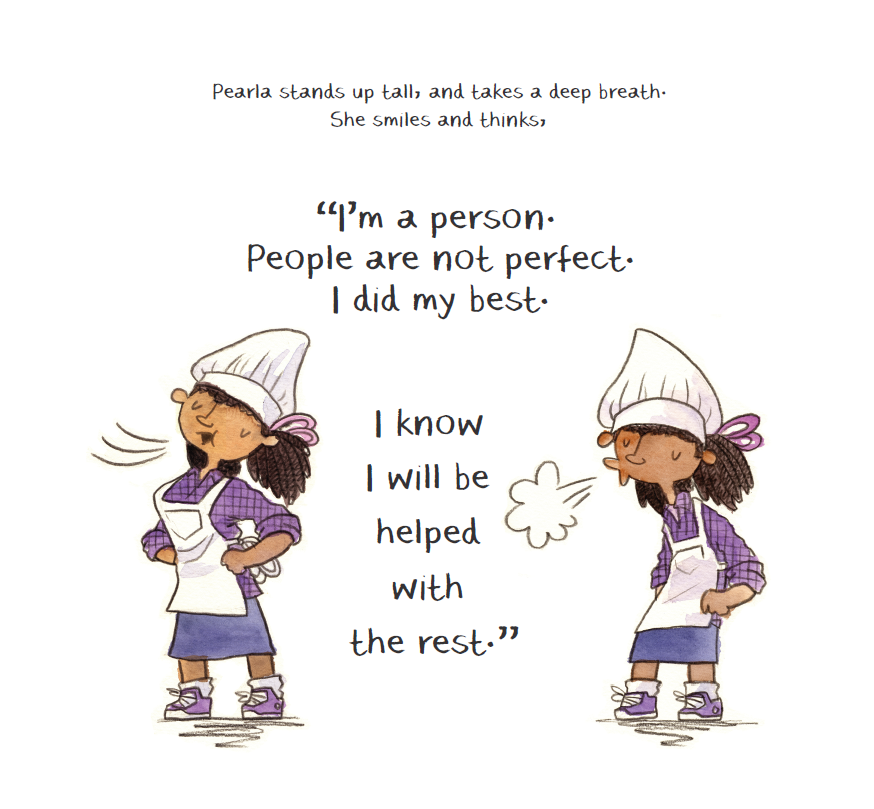
Rochel Lieberman, author of Pearla and her Unpredictably Perfect Day, an empowering story that teaches children how to embrace their mistakes and practice resilience, discusses how parents and professionals can use her book to help children who struggle with anxiety and perfectionism.
When I crafted the characters and the story line of Pearla and Her Unpredictably Perfect Day, I visualized creating a tool that can be easily used both at home and at school. My goal as an author was influenced by my perspective as an Executive Speech Coach, where I spend most of my time working with and on behalf of children. In that capacity, I have educated children, their teachers, therapists, principals, and leaders. Above all else, I’ve gone through this journey as a mom, working alongside educators, helping them bring out the best in their own pupils. Thus, I wrote this book with the following vision: for parents, a book that is simple and can be used flexibly in the fine balancing act that is required of parenthood; for schools, a guide for conversations between children and their teachers or therapists.
I have always viewed books as magical instruments, with the power to transcend reality while simultaneously reinforcing our daily experiences. About fifteen years ago, as a college student, I vividly recall riding a New York City bus alongside a mom and her adorable little boy. Like a real New Yorker, she had a great designer bag—yet with an odd rectangular object poking out of the side. My curiosity was short lived, as her son quickly became bored of looking out the window, prompting her to empty some of the treasures from her bag. Amidst the emerging apple sauce and fruit snacks, the large rectangular shape materialized as a children’s book, which allowed her to entertain and delight her son for the remainder of the bus ride. This mom recognized that alongside a cellphone, keys, and snacks, there was a treasure in carrying a children’s book.
Any adult who has ventured into the land of storytelling with a child knows how widespread the benefits can be. Stories let readers connect with characters, like Pearla, who are having similar challenges, but in a nonthreatening way. They open the door to on-the-spot questions and sometimes even deeper conversations about the way life works, even when it’s not working out well. My hope for parents is that by reading this book together with the child in your life, you can reflect on the story and learn to recognize the triggers that caused Pearla distress, such as Pearla’s desire for perfection, and also learn from her healthy ability to strategize in times of stress. Then, you can have a purposeful conversation to relate these ideas, as applicable, to your own child’s obstacles.
For example, if your child struggles with anxiety from a need to perform perfect work, you can engage in a conversation about making mistakes in general and the thoughts and feelings associated with doing so. With Pearla’s fun storyline, my goal is that you can explore these normally sensitive topics in a casual mode, rather than in a “teaching” mode. To facilitate these conversations, I have included suggested questions in the back of the book. Some examples include questions for recognizing perfectionist tendencies (What do you like to have “perfect”?) and questions that allow the child to reframe their thinking about a perceived negative event (When does Pearla start to see that her cookies and cupcakes are perfect just the way they are?) Keep in mind that these questions can be used as guides to formulate your own question, so that you can speak in a manner that is true to your own communicative style.
As parents, you can use your life experiences or situations other family members have encountered as examples, so your child is reminded that we all make mistakes. You can carry this one step further and talk about the idea that we all expect to make mistakes most every day, and we all have to deal with imperfect situations every day. If you expect to be going to a challenging place, with expected tension or changes of schedule, you can better prepare your child by using words to roleplay the situation and discuss which choices or behaviors are best suited to dealing with the expected encounter. In my experience, these conversations are best done either before or after an event, when the child is not in direct placement of the stressor. Remember, repairs are done after the rainstorm. In the middle of a challenging event, whisper words of encouragement and praise to your child. The longer talks, references to Pearla, and conversational questions can be saved for dry, sunny days.

The character of Pearla arose from my many joyful and zany experiences as a writer, as a mom raising my children, and from my years as a speech language therapist providing services to a wide range of children and adults. Through it all, I observed the growth and powerful learning that clients achieved when they courageously challenged their core beliefs on failure, perfection, and fear of daily challenges. All of us, children, adults, and caregivers alike, are on a journey with many bumps on the surprising road of life. While some of us learn to ride the bumps and face the challenges, others, like Pearla, find it very difficult to handle these imperfections without the help of a caring adult or professional.
A caring therapist, teacher, or allied professional can help children learn to accept impossible-to-avoid changes and challenges in their daily life. Remediating these negative and unhealthy beliefs and feelings is so important, because many times children and adults can carry these painful feelings, along with the ever elusive search for perfection and order, throughout their life’s journey. It is my dream that this book can be used as a tool to foster better social skills by sparking discussions in the classroom or in the safety of a therapist’s office at school or in private practice. The therapist can begin the sessions by attempting to understand the core of the child’s feelings about challenges and beliefs about making mistakes.
Research supports the calming effects of labeling an emotion, as is done in this story (look for the colored phrases in the text). In the privacy of a therapist office, where a child can relate their own story, the therapist can help them label their emotions, using the book as a model. The child and therapist can talk about everyday situations where they may be triggered to experience those emotions. Then, to advance the conversation, the therapist can use the time to problem solve with the child and generate solutions for these everyday experiences. They can discuss possible scenarios or alternative plans that Pearla may have done that would not have been beneficial, such as screaming, stomping her feet or having a tantrum in front of the customers. This can lead to practical discussions about the consequences for each of the solutions that the child suggested.
In a more structured format, the therapist can probe the child with the following questions from the book’s suggested questions in order to help the child recognize emotions (What part of your body begins to hurt when you feel afraid?), to bring awareness to the words that the child says to himself (What words do you think when you feel afraid?) or to gently elicit support for the child (What thoughts can you think to help you feel less afraid?). These conversations are essential, as research supports that the specific words that you say to yourself can alter the way you behave. Answers to these questions will slowly open the door to dealing with daily challenges and imperfections. As one client once said to me, “I am good even though I am not perfect.” There is a lot to be learned from the wisdom in those words. Enjoy reading Pearla and Her Unpredictably Perfect Day with the child in your life and let the talking and learning begin.

You can learn more, read reviews, or purchase a copy of Pearla and her Unpredictably Perfect Day here. To learn more about the author, visit Rochel Lieberman at www.ariberspeech.com, or connect with her on Facebook or Twitter.